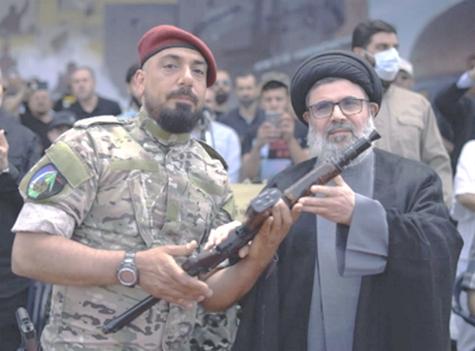Over the years, Hezbollah has deployed many of its top military leaders to Syria to spearhead operations and manage sensitive missions. These figures are not only military commanders but also play key roles in regional planning and coordination with various forces. Two of the most prominent among them are Haitham Ali al-Tabtabai, the field commander of Hezbollah’s elite Radwan Force, and Munir Ali Naim Shaito, also known as Hajj Hashem, who commands the Golan Front. These leaders have become prime targets for Hezbollah’s adversaries due to their influential roles in the ongoing conflict in the region.
Haitham Ali al-Tabtabai: The Commander of Hezbollah’s Elite Radwan Force
Name: Haitham Ali al-Tabtabai
Nickname: Abu Ali al-Tabtabai
Born: 1968
Position: Commander of Hezbollah’s Radwan Force
International Designation: Specially Designated Global Terrorist
Background and Military Role
Haitham Ali al-Tabtabai, also known by his nom de guerre Abu Ali al-Tabtabai, is a prominent military leader within Hezbollah. As the commander of the Radwan Force, Hezbollah’s elite special forces unit, al-Tabtabai holds a key position within the organization. The Radwan Force was formed after the 2006 Lebanon War by Imad Mughniyeh, and its name honors Mughniyeh’s nickname, “Hajj Radwan,” after his assassination in 2008.
Al-Tabtabai’s leadership within the Radwan Force has been central to its operations in Syria and Yemen, where the unit supported the Assad regime during key battles. His forces played a critical role in strategic military operations in Qusayr, Qalamoun, and Aleppo, gaining significant battlefield experience. Known for their infiltration and special attack tactics, the Radwan Force also plays a vital role in Hezbollah’s ambitions in southern Lebanon and northern Israel.
In addition to his military prowess, al-Tabtabai has been instrumental in Hezbollah’s regional operations. He has overseen training and equipment distribution to Hezbollah’s allies, extending Hezbollah’s reach across the region. His influential role and operational capabilities have made him a high-value target for Hezbollah’s adversaries, particularly Israel, which has attempted to assassinate him. In 2015, an Israeli airstrike targeted his convoy in Quneitra, Syria, but failed to eliminate him.
Sanctions and International Designation
Al-Tabtabai’s activities have drawn the attention of international authorities. In 2016, the U.S. Department of State designated him as a Specially Designated Global Terrorist (SDGT) under Executive Order 13224, imposing sanctions and freezing his assets. His leadership role in destabilizing operations across Syria and Yemen prompted the U.S. Rewards for Justice Program to offer a reward of up to $5 million for information leading to his capture or disruption of his plans.
Munir Ali Naim Shaito (Hajj Hashem): The Commander of Hezbollah’s Golan Front
Full Name: Munir Ali Naim Shaito
Nickname: Hajj Hashem
Age: Approx. 50 years old
Marital Status: Married with four children
Position: Commander of Hezbollah’s Golan Front
Background and Military Role
Munir Ali Naim Shaito, better known as Hajj Hashem, is another of Hezbollah’s top military commanders, holding a pivotal role in Hezbollah’s operations in the strategic Golan Heights region. Appointed by Hezbollah Secretary-General Hassan Nasrallah in 2016 after the death of Mustafa Badreddine, Shaito became the commander of the “Liberated Golan Front,” a highly sensitive and strategic role overseeing Hezbollah’s military operations along Syria’s southern front.
As the commander of the Golan Front, Shaito is responsible for coordinating between Hezbollah, the Iranian military presence in Syria, and the Syrian regime. His leadership plays a crucial role in managing military activities in this volatile region, which is not only a frontline in the ongoing Syrian conflict but also a key point of tension with Israel. Hezbollah views the Golan as a significant location for launching future operations against Israel, and Hajj Hashem is a central figure in these strategic plans.
Military History and Operations
Hajj Hashem’s military career is marked by his deep involvement in field operations and Hezbollah’s broader military strategies. One of his most notable early operations was the 2002 attack on the Israeli settlement of Matzova in northern Israel, a major operation at the time. Prior to his current role, Shaito led Hezbollah’s operations north of the Litani River in southern Lebanon, gaining extensive experience in guerrilla warfare and border defense.
Shaito’s role in the Golan makes him a high-priority target for Israeli intelligence. He is believed to be actively involved in preparing for future conflicts with Israel, and Israeli intelligence has kept him under close surveillance. His involvement in shaping Hezbollah’s military strategy for the Golan, a region of significant geopolitical importance, solidifies his position as one of the organization’s most critical military figures.
Surveillance and Security Precautions
Due to his prominence, Hajj Hashem operates under tight security. Israeli intelligence has reportedly monitored his movements closely, publishing images and personal details of him in recent years. Shaito is known to shuttle between Lebanon and Syria, where he maintains residences in both Beirut and Damascus. His strict security measures, including the use of bodyguards, reflect his awareness of being a key target for Israeli forces.
Conclusion: Key Targets in the Conflict
Both Haitham Ali al-Tabtabai and Munir Ali Naim Shaito (Hajj Hashem) are integral figures within Hezbollah’s military leadership, playing essential roles in shaping the group’s regional strategies. Al-Tabtabai, as commander of the Radwan Force, directs Hezbollah’s elite special operations unit, while Shaito, as commander of the Golan Front, oversees Hezbollah’s activities along one of the most strategically sensitive regions in Syria. Their involvement in operations that directly challenge Israel’s security and their coordination with Iranian and Syrian forces make them primary targets in the ongoing conflict. Both commanders are under heavy surveillance and face significant international scrutiny, but their influence within Hezbollah remains critical to the organization’s future strategies in the region.


